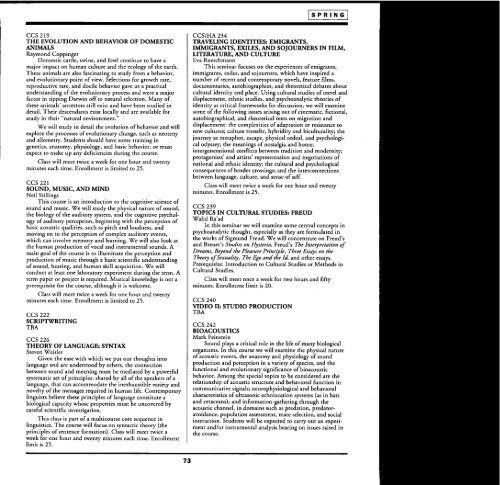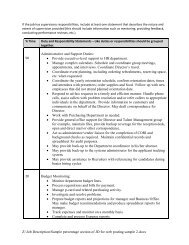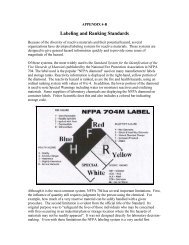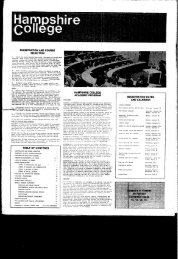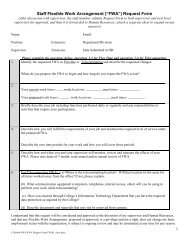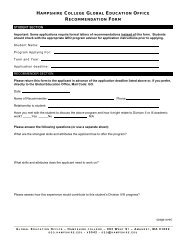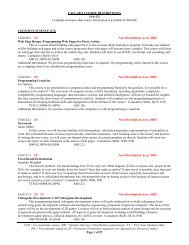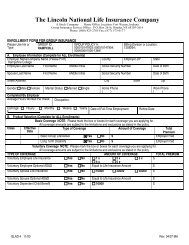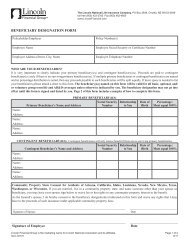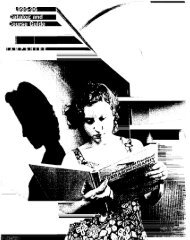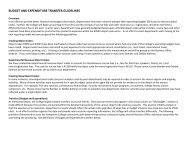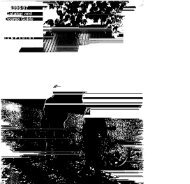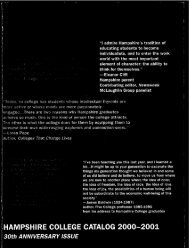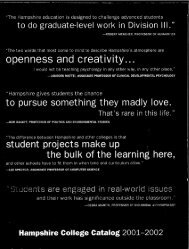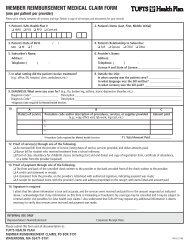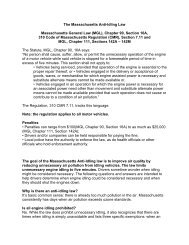school of social science - Hampshire College
school of social science - Hampshire College
school of social science - Hampshire College
Create successful ePaper yourself
Turn your PDF publications into a flip-book with our unique Google optimized e-Paper software.
CCS 219<br />
THE EVOLUTION AND BEHAVIOR OF DOMESTIC<br />
ANIMALS<br />
Raymond Coppinger<br />
Domestic catrle. swine, and fowl cominue to have a<br />
major impact on human culture and the ecology <strong>of</strong> the earth.<br />
These animals are also fascinating to study from a behavior,<br />
and evoludonary point <strong>of</strong> view. Selections for growth rate,<br />
reproducdve rate, and docile behavior gave us a practical<br />
understanding <strong>of</strong> the evolutionary process and were a major<br />
factor in tipping Darwin <strong>of</strong>f to natural selection. Many <strong>of</strong><br />
these animals' ancestors still exist and have been srudied in<br />
detail. Their descendants exist locally and are available for<br />
study in theif "natural environment."<br />
We will study in detail the evolution <strong>of</strong> behavior and will<br />
explore the processes <strong>of</strong> evolutionary change, such as neoteny<br />
and allometry. Students should have some training in<br />
genetics, anatomy, physiology, and basic behavior, or must<br />
expect to make up any deficiencies during the course.<br />
Class will meet twice a week for one hour and twenty<br />
minutes each time. Enrollmem is limited to 25.<br />
CCS 221<br />
SOUND, MUSIC, AND MIND<br />
Neil Stillings<br />
This course is an introduction to the cognitive <strong>science</strong> <strong>of</strong><br />
sound and music. We will study the physical nature <strong>of</strong> sound.<br />
the biology <strong>of</strong> the auditory system, and the cognitive psychology<br />
<strong>of</strong> auditory perception, beginning with the perception <strong>of</strong><br />
basic acoustic qualities, such as pitch and loudness, and<br />
moving on to the perception <strong>of</strong> complex auditory events,<br />
which can involve memory and learning. We will also look at<br />
the human production <strong>of</strong> vocal and instrumental sounds. A<br />
main goal <strong>of</strong> the course is to illuminate the perception and<br />
production <strong>of</strong> music through a basic scientific understanding<br />
<strong>of</strong> sound, hearing, and human skill acquisition. We will<br />
conduct at least one laboratory experiment during the term. A<br />
term paper or project is required. Musical knowledge is not a<br />
prerequisite for the course, although it is welcome.<br />
Class will meet twice a week for one hour and twenty<br />
minutes each time. Enrollment is limited to 25.<br />
CCS 222<br />
SCRIPTWRITING<br />
TBA<br />
CCS 226<br />
THEORY OF LANGUAGE, SYNTAX<br />
Steven Weisler<br />
Given the ease with which we put our thoughts into<br />
language and are understood by others. the connection<br />
between sound and meaning must be mediated by a powerful<br />
systematic set <strong>of</strong> principles, shared by all <strong>of</strong> the speakers <strong>of</strong> a<br />
language, that can accommodate the inexhaustible variety and<br />
novelty <strong>of</strong> the messages required in human life. Contemporary<br />
linguists believe these principles <strong>of</strong> language constitute a<br />
biological capacity whose properties must be uncovered by<br />
careful scientific investigation.<br />
This class is part <strong>of</strong> a multicourse core sequence in<br />
linguistics. The course will focus on syntacdc theory (the<br />
principles <strong>of</strong> sentence formation). Class will meet twice a<br />
week for one hour and twenty minutes each time. Enrollment<br />
limit is 25.<br />
73<br />
ISPRINGI<br />
CCS/HA 234<br />
TRAVELING IDENTITIES: EMIGRANTS,<br />
IMMIGRANTS, EXILES, AND SOJOURNERS IN FILM,<br />
LITERATURE, AND CULTURE<br />
Eva Rueschmann<br />
This seminar focuses on the experiences <strong>of</strong> emigrams,<br />
immigrams, exiles, and sojourners, which have inspired a<br />
number <strong>of</strong> recem and comemporary novels, feature films,<br />
documentaries, autobiographies, and theoretical debates about<br />
cultural identity and place. Using cultural studies <strong>of</strong> travel and<br />
displacemem, ethnic studies, and psychoanalytic theories <strong>of</strong><br />
identity as critical frameworks for discussion, we will examine<br />
some <strong>of</strong> the following issues arising out <strong>of</strong> cinematic, fictional,<br />
autobiographical, and theoretical texts on migration and<br />
displacement: the complexities <strong>of</strong> adaptation or resistance to<br />
new cultures; culture transfer, hybridity and biculturality; the<br />
journey as metaphor, escape, physical ordeal, and psychological<br />
odyssey; the meanings <strong>of</strong> nostalgia and home;<br />
intergenerational conflicts between tradition and modernity;<br />
protagonists' and artists' representation and negotiations <strong>of</strong><br />
national and ethnic identity; the cultural and psychological<br />
consequences <strong>of</strong> border crossings; and the interconnections<br />
between language, culture, and sense <strong>of</strong> self.<br />
Class will meet twice a week for one hour and twenty<br />
minutes. Enrollmem is 25.<br />
CCS 239<br />
TOPICS IN CULTURAL STUDIES: FREUD<br />
Walid Ra'ad<br />
In this seminar we will examine some central concepts in<br />
psychoanalytic thought, especially as they are formulated in<br />
the works <strong>of</strong> Sigmund Freud. We will concentrate on Freud's<br />
and Breuer's Studies on Hysteria, Freud's The Interpretation <strong>of</strong><br />
Dreams, Beyond the Pleasure Principle, Three Essays on the<br />
Theory <strong>of</strong> Sexuality, The Ego and the [d, and other essays.<br />
Prerequisite: Introduction to Cultural Studies or Methods in<br />
Cultural Studies.<br />
Class will meet once a week for two hours and fifty<br />
minutes. Enrollment limit is 20.<br />
CCS 240<br />
VIDEO II, STUDIO PRODUCTION<br />
TBA<br />
CCS 242<br />
BIOACOUSTICS<br />
Mark Feinstein<br />
Sound plays a critical role in the life <strong>of</strong> many biological<br />
organisms. In this course we will examine the physical nature<br />
<strong>of</strong> acoustic events, the anatomy and physiology <strong>of</strong> sound<br />
production and perception in a variety <strong>of</strong> species, and the<br />
functional and evolutionary significance <strong>of</strong> bioacollstic<br />
behavior. Among the special topics to be considered are the<br />
relationship <strong>of</strong> acoustic structure and behavioral function in<br />
communicative signals; neurophysiological and behavioral<br />
characteristics <strong>of</strong> ultrasonic echolocation systems (as in bats<br />
and cetaceans); and information.gathering through the<br />
acoustic channel, in domains such as predation, predatoravoidance.<br />
population assessment, mate selection. and <strong>social</strong><br />
interaction. Students will be expected to carry out an experiment<br />
andlor instrumental analysis bearing on issues raised in<br />
the course.


